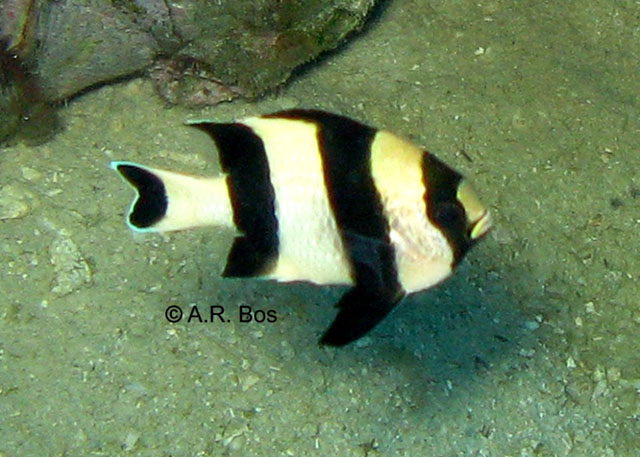| Pomacentridae (Damselfishes), subfamily: Chrominae |
| 8 cm TL (male/unsexed) |
|
reef-associated; marine; depth range 1 - 68 m, non-migratory |
| Western Pacific: Sumatra to Vanuatu, north to the Ryukyu Islands, south to New Caledonia. Recently recorded from Tonga (Ref. 53797). |
|
Dorsal spines (total): 12-12; Dorsal soft rays (total): 12-13; Anal spines: 2-2; Anal soft rays: 12-13. Color in life white with 3 black bars; has a black area over the outer two-thirds of the tail, which distinguishes it from D. aruanus; pelvic fins black; pectoral fins transparent. Tubed lateral lines scales 16 to 17. Margins of preorbital, suborbital, and preoperculum finely serrated (Ref. 2746). Body depth 1.5-1.7 in SL (Ref. 90102). |
| Schooling species, adults inhabit sheltered lagoons, harbors and inlets. Also in somewhat open substrates with outcrops of Acropora corals (Ref. 48636). Often associated with small coral heads. Feed on a variety of plankton, including larval shrimps and crabs, algae, ostracods, amphipods, pelagic tunicates, copepods, and fish eggs. Oviparous, distinct pairing during breeding (Ref. 205). Eggs are demersal and adhere to the substrate (Ref. 205). Males guard and aerate the eggs (Ref. 205). Diurnal species (Ref. 54980; 113699). |
|
Least Concern (LC); Date assessed: 23 September 2021 Ref. (130435)
|
| harmless |
Source and more info: www.fishbase.org. For personal, classroom, and other internal use only. Not for publication.

